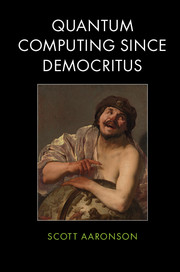Crossref Citations
This Book has been
cited by the following publications. This list is generated based on data provided by Crossref.
Sanders, Barry C.
2013.
Reversible Computation.
Vol. 7948,
Issue. ,
p.
1.
Burgarth, Daniel Klaus
Facchi, Paolo
Giovannetti, Vittorio
Nakazato, Hiromichi
Pascazio, Saverio
and
Yuasa, Kazuya
2014.
Exponential rise of dynamical complexity in quantum computing through projections.
Nature Communications,
Vol. 5,
Issue. 1,
Wang, Hongbin
and
Sun, Yanlong
2014.
On Quantum Models of the Human Mind.
Topics in Cognitive Science,
Vol. 6,
Issue. 1,
p.
98.
Lloyd, S.
and
Montangero, S.
2014.
Information Theoretical Analysis of Quantum Optimal Control.
Physical Review Letters,
Vol. 113,
Issue. 1,
Bentivegna, Marco
Spagnolo, Nicolò
Vitelli, Chiara
Brod, Daniel J.
Crespi, Andrea
Flamini, Fulvio
Ramponi, Roberta
Mataloni, Paolo
Osellame, Roberto
Galvão, Ernesto F.
and
Sciarrino, Fabio
2014.
Bayesian approach to Boson sampling validation.
International Journal of Quantum Information,
Vol. 12,
Issue. 07n08,
p.
1560028.
Tichy, Malte C
2014.
Interference of identical particles from entanglement to boson-sampling.
Journal of Physics B: Atomic, Molecular and Optical Physics,
Vol. 47,
Issue. 10,
p.
103001.
Sekatski, Pavel
Sangouard, Nicolas
and
Gisin, Nicolas
2014.
Size of quantum superpositions as measured with classical detectors.
Physical Review A,
Vol. 89,
Issue. 1,
Tichy, Malte C.
Mayer, Klaus
Buchleitner, Andreas
and
Mølmer, Klaus
2014.
Stringent and Efficient Assessment of Boson-Sampling Devices.
Physical Review Letters,
Vol. 113,
Issue. 2,
Cour, Brian R La
and
Ott, Granville E
2015.
Signal-based classical emulation of a universal quantum computer.
New Journal of Physics,
Vol. 17,
Issue. 5,
p.
053017.
Tichy, Malte C.
2015.
Sampling of partially distinguishable bosons and the relation to the multidimensional permanent.
Physical Review A,
Vol. 91,
Issue. 2,
Melucci, Massimo
2015.
Introduction to Information Retrieval and Quantum Mechanics.
Vol. 35,
Issue. ,
p.
189.
Paraoanu, Gheorghe S.
2015.
Romanian Studies in Philosophy of Science.
Vol. 313,
Issue. ,
p.
181.
Cuffaro, Michael E.
2015.
How-Possibly Explanations in (Quantum) Computer Science.
Philosophy of Science,
Vol. 82,
Issue. 5,
p.
737.
Hepp, K.
2015.
The Message of Quantum Science.
Vol. 899,
Issue. ,
p.
235.
Melucci, Massimo
2015.
Introduction to Information Retrieval and Quantum Mechanics.
Vol. 35,
Issue. ,
p.
1.
2015.
The Wonders of Light.
p.
89.
Melucci, Massimo
2015.
Introduction to Information Retrieval and Quantum Mechanics.
Vol. 35,
Issue. ,
p.
101.
Melucci, Massimo
2015.
Introduction to Information Retrieval and Quantum Mechanics.
Vol. 35,
Issue. ,
p.
53.
Reus, Bernhard
2016.
Limits of Computation.
p.
227.
La Cour, Brian R.
Ostrove, Corey I.
Ott, Granville E.
Starkey, Michael J.
and
Wilson, Gary R.
2016.
Classical emulation of a quantum computer.
International Journal of Quantum Information,
Vol. 14,
Issue. 04,
p.
1640004.





